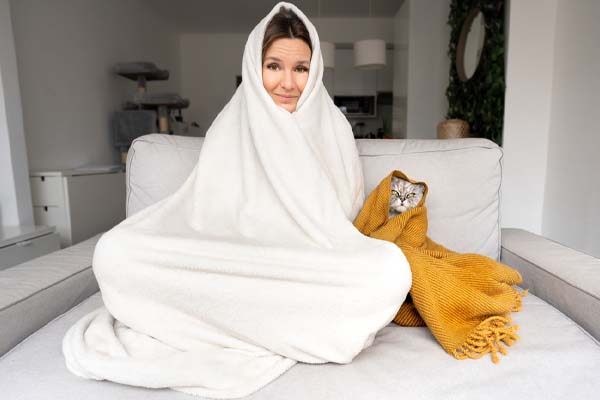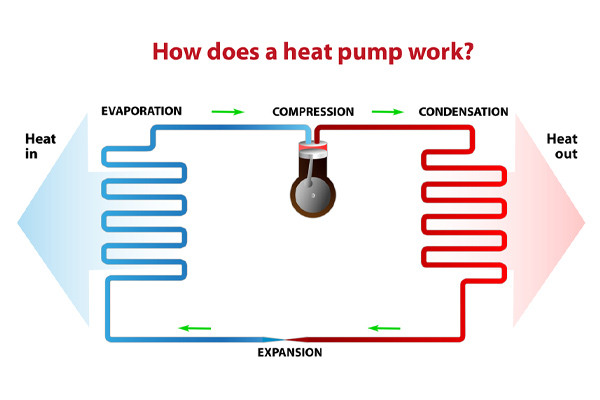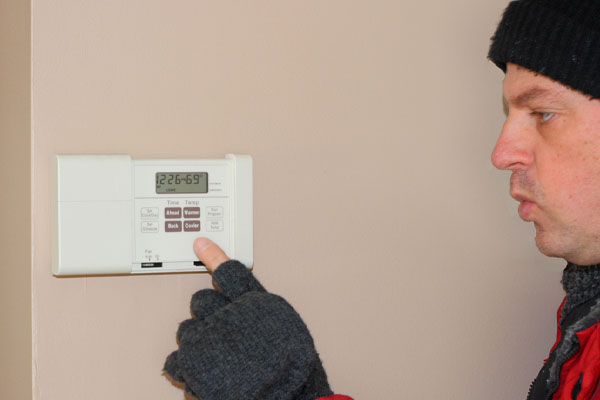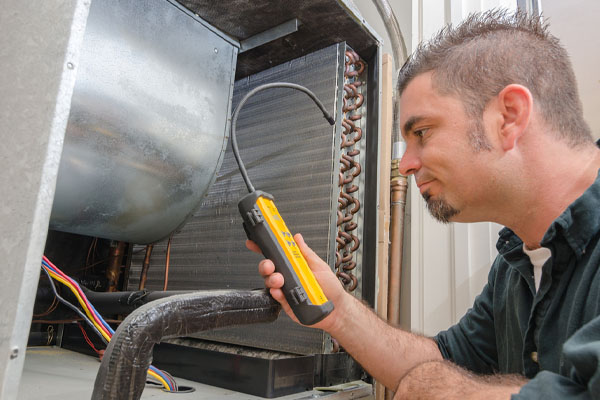Can Winter Weather Affect Your Heat Pump’s Performance?

You can rely on your heat pump to help you stay warm during winter. All you have to do is set your ideal temperature at the thermostat, wait several minutes, and then enjoy the difference. Your heat pump will keep you and every else in your household comfortable. However, there are several problems and flaws that you may need to address at times, just as there are with all other HVAC equipment types. Knowing what these help consumers establish reasonable expectations and make the right decisions when troubleshooting their heat pumps. Likewise, it will help you detect when to schedule heating services with enough time. This article will cover a major issue: a heat pump not keeping up because the winter temperatures are too cold.
Heat Pump & Winter Temperatures
Contents
This is actually a common problem. You might adjust your thermostat to a specific temperature, and your heat pump might do all that it can to create it. However, the inside of your home remains several degrees below the temperature you prefer, irrespective of how long your heat pump is left warming.
Given that it is still fairly warm inside their homes, a lot of people aren’t really bothered by the difference. Others recognize and are bothered by their heat pump’s ability to create ideal conditions. They might contact their HVAC providers to do something about it. In some instances, heat pumps may have legitimate issues that need to be repaired. More commonly, however, these systems are working exactly as they should. Heat pumps aren’t usually able to produce massive amounts of heat when the outside temperature is extremely cold.
How Heat Pumps Work

Let’s go over how a heat pump functions to get a better idea of the underlying problem. These devices are multi-functional, which means that they can both cool homes down and heat them up. More often than not, it’s necessary to have an air conditioner for summer cooling and a furnace for winter heating. Heat pumps have the year-round ability to regulate indoor temperatures all by themselves by providing heated or cooled air as needed. This simplifies both maintenance and installation. Heat pumps transmit heat from one side to the home (by moving outside air in and inside air out). Thermal transmission is supported by the circulation of refrigerant and strategic times adjustments in pressure. Each heating cycle brings the interior space closer to the temperature that’s been set at the thermostat.
During the summer months, heat pumps cool homes down by allowing their refrigerant to absorb heat from the indoor air. This heat is released outside via the heat pump’s exterior unit. Air is blown by the heat pump’s fan across the coils to expedite this process. Before the next round is started, the refrigerant within the unit is depressurized. During the winter, the entire procedure is reversed. Heat pumps move hot air from outdoors into the interior of buildings. Given the bitterly cold temperatures that winter brings, this might seem a bit strange, but it remains possible for heat pumps to do as long as outside temperatures never fall below zero.
Properly-Functioning Heat Pump Cannot Reach Thermostat’s Temperature Setting
It’s important to note that as the winter weather grows colder, heat pumps have an increasingly difficult time collecting heat from outside. After the temperature drops below 35 degrees (Fahrenheit), the efficiency of heat pumps declines. These units start struggling to keep homes warm when outdoor temperatures fall below zero degrees.
This is one reason why heat pumps are most often used in regions that have relatively mild winter temperatures. Homes that have furnaces or boilers tend to be more common in areas with harsh winter weather. Hybrid heating systems that combine gas-fired heaters and heat pumps can be used as well. Gas-fired heaters work well in extremely cold conditions, and heat pumps function well when the weather is mild.
One way to fix the thermostat is by raising your thermostat setting by several degrees to move beyond this limitation. For instance, if your thermostat is set at 71 degrees, but your indoor temperature never rises beyond 69 degrees, raise the setting to 73 or 75 degrees to see if conditions improve. This is a simple and practical troubleshooting strategy that may help you stay warm as your heat pumps gets along in age. Even though your older heat pump might remain operational, it could need a little extra help to deliver sufficient heat.
Causes For A Heat Pump That Isn’t Meeting the Temperature Setting

Read on to learn more about common heat pump issues, such as those that impact how well your heat pump distributes warm air when outside temperatures are low.
1. The Outside Heat Pump Unit Is Frozen
If a heat pump isn’t performing well, it may be that its outside unit is frozen. When outside temperatures fall too low, these components can develop a layer of ice. This ice will obstruct normal airflow and keep heat absorption from happening. Most heat pumps are able to enter into a defrost cycle that resolves this problem. This should restore normal functioning. However, if the ice never melts, you should get help from a professional.
2. The Outside Heat Pump Unit Is Malfunctioning
Even if the outside unit isn’t covered in ice, it may be malfunctioning as the result of a broken part. There are several heat pump troubleshooting strategies you can try. Make sure that the power is on if your heat pump isn’t working at all. Check all of the openings for clogs. If there are clogs within the air filters, replace them. This will benefit overall heating functions and give you the benefit of clean air. Get in touch with a licensed HVAC company if there are no changes after you’ve taken these steps. The reversing valve could be having an issue or there may be problems at the indoor units or other components that are responsible for ensuring a seamless heating cycle.
3. Your Home Doesn’t Have Enough Insulation
Insufficient house insulation could be the reason why your heat pump isn’t able to create or maintain your ideal indoor temperature. Despite its hardest efforts, your heat pump may have a hard time keeping up with the rate of heat loss that is occurring at the roof and walls. There might be an open window in your home that’s allowing cold air to flow in. There may be air leaks that require weatherstripping or caulking. HVAC professionals can help you find and deal with these leaks to improve the overall energy efficiency of your home.
Related Article: Do Leaky Windows Affect How My Home Is Heated?
4. There Isn’t Enough Refrigerant In Your Heat Pump

If there isn’t enough refrigerant, your heat pump will have a hard time absorbing heat. Get in touch with a trusted HVAC company in your area to have any refrigerant leaks resolved and to have refrigerant recharge service performed. Find out what kind of heat pump you own so that your HVAC technician can deliver the right refrigerant.
5. You’ve Got an Improperly Sized Heat Pump
If your heat pump is always underperforming, it may be too small for your home. A unit that’s too small won’t be able to provide adequate heat. An HVAC company can perform a load calculation to confirm HVAC sizing issues. It may be necessary to replace a small heat pump with one that’s larger.
6. The Thermostat Is Faulty
Thermostat problems make be the reason why your heat pump isn’t creating the temperature you want. It may be that your thermostat needs to be calibrated. This could be the result of a low battery or faulty sensors. You should also check to find out if there’s a nearby heat source that’s affecting the sensor’s readings.
Related Article:8 Reasons Your Heat Pump Can Cause Your Breaker To Trip
7. Your Heat Pump Is Old
Finally, it could be that your heat pump is old and has sustained a lot of wear. It isn’t as efficient as it used to be, and so, it’s having a hard time heating your house. Most heat pumps are built to last for about 12 years. If yours is older, you should think about replacing it altogether. When choosing a new heat pump, it’s best to have licensed HVAC contractors help you.
Conclusion
On extremely cold winter days, you might find that your heat pump’s ability to deliver heat is limited. This is often due to the way in which heat pumps function. As such, you don’t necessarily have to worry about equipment malfunction. Until the weather grows warmer, auxiliary heat pump settings or an additional source of heating can help keep everyone warm. If you’re not experiencing extremely cold temperatures but your heat pump’s performance is still poor, get in touch with an HVAC professional for heat pump maintenance, replacement, or repairs.
Call Point Bay Fuel for Your HVAC Requirements

Point Bay Fuel provides heating and cooling services in Ocean and Monmouth County, New Jersey. We retain professional technicians who facilitate your HVAC installations, repairs, tune-ups, and replacements. Our technicians are experienced, trained, and knowledgeable to perform HVAC system work to your satisfaction.
Point Bay Fuel provides cooling and heating services at competitive prices in the area. We provide superb maintenance services that improve your comfort, energy efficiency, and more. Our work ensures that you have reduced cooling and heating costs. If your HVAC system needs repair or replacement, we recommend what can work best for your home and budget. We stand by our work because we want our clients to be comfortable. Do you need to schedule an appointment? Call Point Bay Fuel today. Click here to view our service area.
Contact us now by calling (732) 349-5059 to speak to one of our home comfort specialists!
